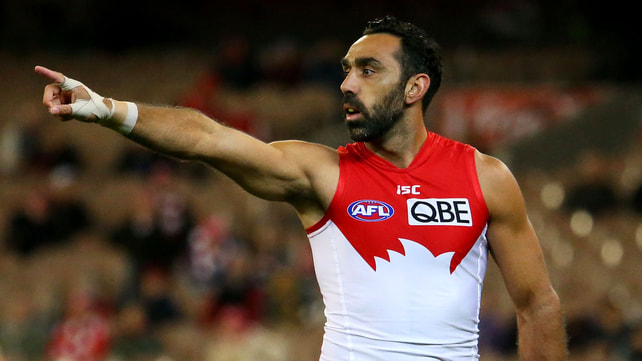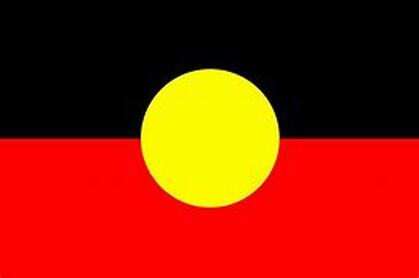THE AUSTRALIAN DREAM
****
Director: Daniel Gordon
Screenwriter: Stan Grant
Principal cast:
Adam Goodes
Stan Grant
Lisa Goodes
Michael O’Loughlin
Nova Peris
Linda Burney
Tracey Holmes
Country: Australia
Classification: MA15+
Runtime: 105 mins.
Australian release date: 22 August 2019
Previewed at: Sony Pictures, Theatrette, Sydney, on 7 August 2019.
Daniel Gordon’s The Australian Dream is one of two recent documentaries to examine the racist booing that dogged AFL legend Adam Goodes in his final years playing for the Sydney Football Club. Indeed, this shocking event brought an end to the proud Adnyamathanha man’s illustrious footy career. Ian Darling’s The Final Quarter was launched at this year’s Sydney Film Festival and subsequently shown on television and, now, The Australian Dream, written by journalist Stan Grant, is getting a national theatrical release. These two films delve into the nature of the ‘casual’ racism and discrimination that pervades much of Australian society today. In a country with a PM whose mantra is, “if you have a go, you’ll get a go…”, this profoundly disturbing documentary is a reminder that, if you are an indigenous Australian, simply “having a go” is not enough. If a two-time Brownlow Medal winner and Australian of the Year can’t “get a go”, who can? Being Aboriginal means you are as vulnerable today as your forebears were when Captain Cook first declared the land ‘terra nullius’. Add to this the distressing fact that many Australians just simply do not believe that they are racist, and you get some idea why a 13-year-old white girl thinks it’s acceptable to call an Aboriginal adult male “an ape”.
That shameful event took place during a football match in Melbourne in 2013. Goodes responded to her words by pointing to the girl and insisting that she be removed from the stand. His action created a media storm and resulted in a public debate that divided the country. He was vilified by rednecks and congratulated by anti-racists, but it led to him being relentlessly booed every time he took to the field over the next two years. Compounding the affair, it was not just large numbers of the public who turned on him, but also certain sports and media commentators and the administrators of the AFL were slow in coming to their player’s defence. Goodes was under intense emotional strain and it denied him any pleasure from his love of the game. Returning to country, he reflected on his race, his identity and his sense of belonging, and it was there that he made the decision to quit AFL at the end of 2015.
Returning to Australia after a long stint overseas, The Australian Dream screenwriter, Stan Grant, was over-whelmed by the slurs against Goodes. He has written that, “This wasn’t about sport; this was about our shared history and our failure to reconcile. Some sought to deny this, some to excuse it - to explain it away - but when thousands of voices booed Adam Goodes, my people knew where that came from. To us it sounded like a howl: a howl of humiliation that echoed across two centuries of dispossession, exclusion, desegregation. It was the howl of people dead on the Australian frontier; killed in wars Australia still does not speak about. It was the howl of people locked up: a quarter of the prison population is Indigenous. It was the howl of hungry children; women beaten and men in chains.” He has also declared that racism was having a deeply negative affect on the Australian Dream and it was time for people to recognise this attitude which pervaded the psyche of the country, to stand up to “…two centuries of dispossession, injustice, suffering and survival.”
The irony is that this powerful work is directed by an Englishman, Daniel Gordon, who claims that, “My removal from the story allowed me to see the bigger picture; I don’t think anyone inside Australia could’ve made this documentary.” The Australian Dream is a beautifully constructed film (edited by Matt Wyllie) that makes good use of Cornel Wilczek’s score, and there is a range of interviewees from both sides of the discussion; the most important voice though is, of course, that of Goodes himself. One can only hope that the people who refuse to recognise the First People of this nation, and give them the respect that is long overdue, will watch this deeply emotional work and acknowledge that it’s time to make good the wrong-doings of the past. Otherwise Australia is doomed to continue to adhere to a history that is, in the words of Tracey Holmes, “a blight on all of us.”
Screenwriter: Stan Grant
Principal cast:
Adam Goodes
Stan Grant
Lisa Goodes
Michael O’Loughlin
Nova Peris
Linda Burney
Tracey Holmes
Country: Australia
Classification: MA15+
Runtime: 105 mins.
Australian release date: 22 August 2019
Previewed at: Sony Pictures, Theatrette, Sydney, on 7 August 2019.
Daniel Gordon’s The Australian Dream is one of two recent documentaries to examine the racist booing that dogged AFL legend Adam Goodes in his final years playing for the Sydney Football Club. Indeed, this shocking event brought an end to the proud Adnyamathanha man’s illustrious footy career. Ian Darling’s The Final Quarter was launched at this year’s Sydney Film Festival and subsequently shown on television and, now, The Australian Dream, written by journalist Stan Grant, is getting a national theatrical release. These two films delve into the nature of the ‘casual’ racism and discrimination that pervades much of Australian society today. In a country with a PM whose mantra is, “if you have a go, you’ll get a go…”, this profoundly disturbing documentary is a reminder that, if you are an indigenous Australian, simply “having a go” is not enough. If a two-time Brownlow Medal winner and Australian of the Year can’t “get a go”, who can? Being Aboriginal means you are as vulnerable today as your forebears were when Captain Cook first declared the land ‘terra nullius’. Add to this the distressing fact that many Australians just simply do not believe that they are racist, and you get some idea why a 13-year-old white girl thinks it’s acceptable to call an Aboriginal adult male “an ape”.
That shameful event took place during a football match in Melbourne in 2013. Goodes responded to her words by pointing to the girl and insisting that she be removed from the stand. His action created a media storm and resulted in a public debate that divided the country. He was vilified by rednecks and congratulated by anti-racists, but it led to him being relentlessly booed every time he took to the field over the next two years. Compounding the affair, it was not just large numbers of the public who turned on him, but also certain sports and media commentators and the administrators of the AFL were slow in coming to their player’s defence. Goodes was under intense emotional strain and it denied him any pleasure from his love of the game. Returning to country, he reflected on his race, his identity and his sense of belonging, and it was there that he made the decision to quit AFL at the end of 2015.
Returning to Australia after a long stint overseas, The Australian Dream screenwriter, Stan Grant, was over-whelmed by the slurs against Goodes. He has written that, “This wasn’t about sport; this was about our shared history and our failure to reconcile. Some sought to deny this, some to excuse it - to explain it away - but when thousands of voices booed Adam Goodes, my people knew where that came from. To us it sounded like a howl: a howl of humiliation that echoed across two centuries of dispossession, exclusion, desegregation. It was the howl of people dead on the Australian frontier; killed in wars Australia still does not speak about. It was the howl of people locked up: a quarter of the prison population is Indigenous. It was the howl of hungry children; women beaten and men in chains.” He has also declared that racism was having a deeply negative affect on the Australian Dream and it was time for people to recognise this attitude which pervaded the psyche of the country, to stand up to “…two centuries of dispossession, injustice, suffering and survival.”
The irony is that this powerful work is directed by an Englishman, Daniel Gordon, who claims that, “My removal from the story allowed me to see the bigger picture; I don’t think anyone inside Australia could’ve made this documentary.” The Australian Dream is a beautifully constructed film (edited by Matt Wyllie) that makes good use of Cornel Wilczek’s score, and there is a range of interviewees from both sides of the discussion; the most important voice though is, of course, that of Goodes himself. One can only hope that the people who refuse to recognise the First People of this nation, and give them the respect that is long overdue, will watch this deeply emotional work and acknowledge that it’s time to make good the wrong-doings of the past. Otherwise Australia is doomed to continue to adhere to a history that is, in the words of Tracey Holmes, “a blight on all of us.”

